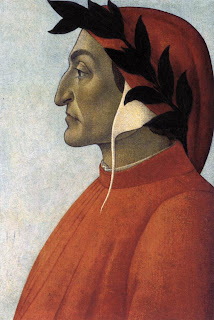What connection can there be between the Supreme Poet and experimental medical research?
One of the most bitter controversy - in the field of bioethics - see, in constant comparison and conflict, religion and science, the Catholic Church and libertarian secularism, faith and reason.
But how it is possible to compare the medical research and Dante Alighieri seems neither hazardous nor blasphemous enough, in this respect, go to a review of Songs of the Divine Comedy where this issue is dealt with in great of details that can reconcile the "vexed question" on the soul and the conception of human life.
The song in question is the twenty-fifth of the Purgatorio, where the poet and his guide, Virgil, Roman poet meet the moni - lived between 45 and 96 AD - Neapolitan origin, author of ' work in verse, "the Thebaid."
It was in the sixth frame of the second otherworldly realm, where those who are serving the sentence on the ground sin of avarice or prodigality.
In this Canto, Dante rejoices in this opportunity to express Once again, his admiration for the high Virgil In fact, the poet Statius, who came to know the name Dante's guide, prostrate at the feet of Virgil in an attempt to embrace them, as it was used in those days, in order to express the admiration and gratitude to those who were equipped with knowledge and wisdom.
Returning to the initial problem, Dante does not think historically appropriate to entrust Virgil discussion of a topic so high, so it relies on Statius the resolution of a doubt, as expressed to his guide, and this, to support, with more authenticity, the thesis of Aristotle and Aquinas about the beginning of the actual spiritual life of the fetus, since Statius had lived in the Christian era .
Statius, Virgil and for him, and, for both, Dante, faithful to the Aristotelian philosophy and the interpretation thereof has given S. Thomas Aquinas, examines, first, with poetic delicacy that is proper, the mystery of conception, as it is known today, in keeping with the current gynecological science, then move on to demonstrate genetic theological and fetal development and physiological structure of the same.
We have already referred to the Aristotelian concept that considers all the diverse life that originates in nature with a vegetative soul is the case of the plant world, the animalistic life forms, is added to the first the sensitive soul.
Only the human fetus, and only then, is God infused the intellectual soul, but this only occurs when the unborn child has been the complete development of the brain, so this soul absorbs the other two, that also acts as vegetative and sensitive; Dante sums up everything in just nine lines, namely from the verse 69 to verse 78, XXV always singing, and it's worth echoing:
".... .. as soon as the fetus isThe articulation of the brain is perfect,the First Mover turns to happyOver so great art of nature, and breathenew Spirit of truth replete,that what is active there, pullin its substance, and becomes one soul,who lives and feels and who he is and turns itself.And why not wonder at my word,see the warmth of the sun that is made winecome to the juice that from the vine. "
But because the soul, that the Creator has infused itself informs the baby?
Dante answers to this question with one word "perfect", that the fetus is the work of nature, complete and harmonious structure, only when the nervous system is completed in the structuring of the brain, nor, on the other hand , an entity is immortal and eternal expression of the divine power can sanctify that which is not complete. In Genesis, we read, however, that God created Adam, in ways similar to him, so perfect and well-structured, did not give blood to a fetus!
Ovviamente, questa rimane interpretazione personale, non certo mia, ma del sommo Dante, che, se fosse nostro contemporaneo, non troverebbe alcun motivo religioso che fosse ostativo all'uso di cellule prelevate da ovuli fecondati.

0 comments:
Post a Comment